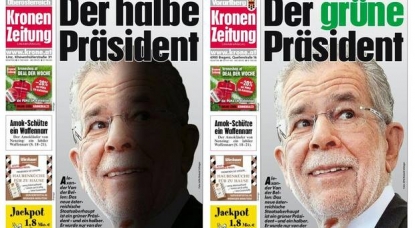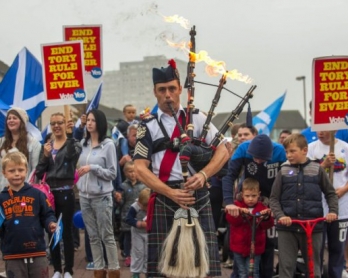'People love to dislike the Austrians'
Vienna -- It’s the most important presidential election Austria has had in years and I and the rest of the bureau can’t take our eyes off a screen showing a German television series, with two actors in Bavarian costumes waving a rifle with a conspiratorial air.

The eyes of Europe, if not the world are turned to Austria, as this election could see the birthplace of Adolf Hitler become the first European nation to elect a far-right head of state since World War II. Norbert Hofer, the candidate of the extreme right Freedom Party of Austria, is running neck in neck with Alexander Van der Bellen, the former head of the Greens party.
And all the ORF public television can show is a tacky slapstick television series.
Above the actors’ tyrolian hats, a ticker tape says that election results will be announced shortly. It’s actually Monday, the day after the actual voting, because this election is so close that it has gone down to the absentee ballots. But for ORF, it’s just an ordinary day, with apparently no reason to interrupt regular-scheduled programming.
All of us at the AFP bureau are literally on the edge of our seats, praying that the interior ministry takes to the airwaves, as social networks are abuzz with the name of the supposed winner. Instead we get a “cheers!” as the two Bavarians on screen clink their glasses.
On the morning of the presidential election, I wake up to classical music, as I have on each morning since I came to Austria, also the birthplace of Mozart, eight months ago. It’s not that I am trying to glimpse the Austrian soul as a foreign correspondent, it’s just that I don’t have a choice. The programming of the main national news radio runs something along the following -- classical music, half hour of news, classical music, quarter of an hour of news, classical music.
Austria was the last EU country to end the government monopoly over television and radio, in 2001. Today there are only three private Austrian television channels, in addition to the German ones that air in the country. So not a lot of choice and they all tend to be bland and calm.
My previous posting was in Greece, where the television and radio marketplace is much more competitive and the programming quite lively and sensationalist. You do find sensationalism in Austrian media, but in the written press, specifically “La Kronenzeitung,” a daily that has a circulation of 885,000 and an estimated readership of three million -- impressive figures in a country of 8.5 million.
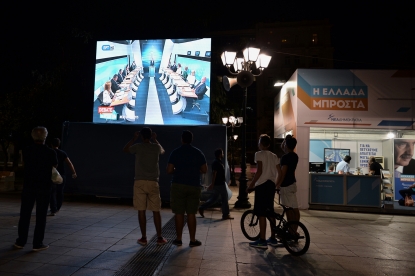 Passersby watch a televised debate in central Athens, September, 2015.
(AFP / Louisa Gouliamaki)
Passersby watch a televised debate in central Athens, September, 2015.
(AFP / Louisa Gouliamaki)You find it all in the “Kronen” -- crime news, especially when the perpetrators are foreigners, immigration, the weakness of politicians, the fear of the power of Brussels. The daily has been published for more than 50 years and is known for articles that cultivate the fear of “others,” be they foreigners or eurocrats, and a nostalgia for a certainty and prosperity of the past… in a country that is both calm and prosperous. Though it does occasionally veer off this well-trodden path -- by hailing for example Conchita Wurst, the Austrian transvestite winner of the 2014 Eurovision song contest.
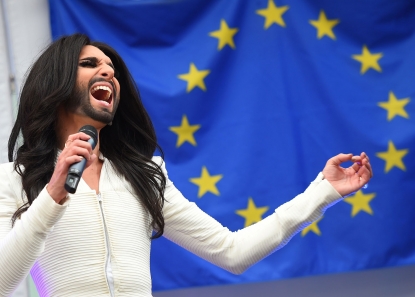 Conchita Wurst (AFP / Emmanuel Dunand)
Conchita Wurst (AFP / Emmanuel Dunand)So the Kronen is the country’s number one newspaper and you find the fears espoused by it whenever you interview the supporters of the far-right Freedom Party (FPO). The party’s success dates back to the 1990s (remember Jorg Haider? ) and it was even part of the ruling coalition between 2000 and 2006.
One of the reasons this Austrian election was so interesting was because it reflected the general tendencies across the continent of anti-EU, anti-immigration, right-wing parties gathering power. Think France’s National Front, Britain’s UKIP, etc.
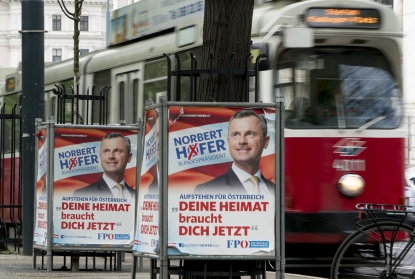 Norbert Hofer campaign posters in Vienna, April 2016.
(AFP / Joe Klamar)
Norbert Hofer campaign posters in Vienna, April 2016.
(AFP / Joe Klamar)During this election I met many people who were sick of the image their country has gotten thanks for the likes of Haider and Hofer. This image certainly stood in contrast to what I witnessed this summer, when both the government and ordinary citizens came together to welcome the 90,000 refugees that during the vast migrant exodus of 2015 stopped asked for asylum in this country.
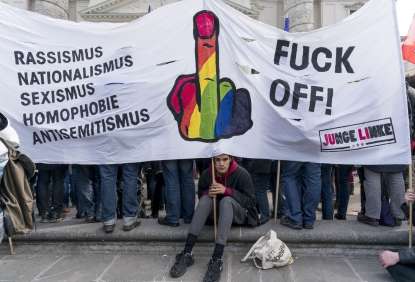 A pro-refugee rally in Vienna, March 2016.
(AFP / Joe Klamar)
A pro-refugee rally in Vienna, March 2016.
(AFP / Joe Klamar)“People love to dislike the Austrians,” a student at an anti-fascist rally told me once bitterly. And in a way, he had a point. Because of its past, debate on the far-right in Austria will always be tinged with the burden of history.
Eventually on that Monday, ORF public television broke away from the slapstick police television series to announce the election results -- the far-right Hofer lost by a slight margin of some 30,000 votes, with Van der Bellen getting 50.3 percent of the votes to Hofer’s 49.7 percent. The next day, the Kronen, like all other newspapers, ran a photo of the winner on its front page. But half of his face was hidden in the shadows under the headline “the half-president.” But in the Vorarlberg region, where Van der Bellen came out ahead, the front page was a bit different. All of his face was shown under the headline 'The green president."
This blog was translated by Yana Dlugy in Paris.
